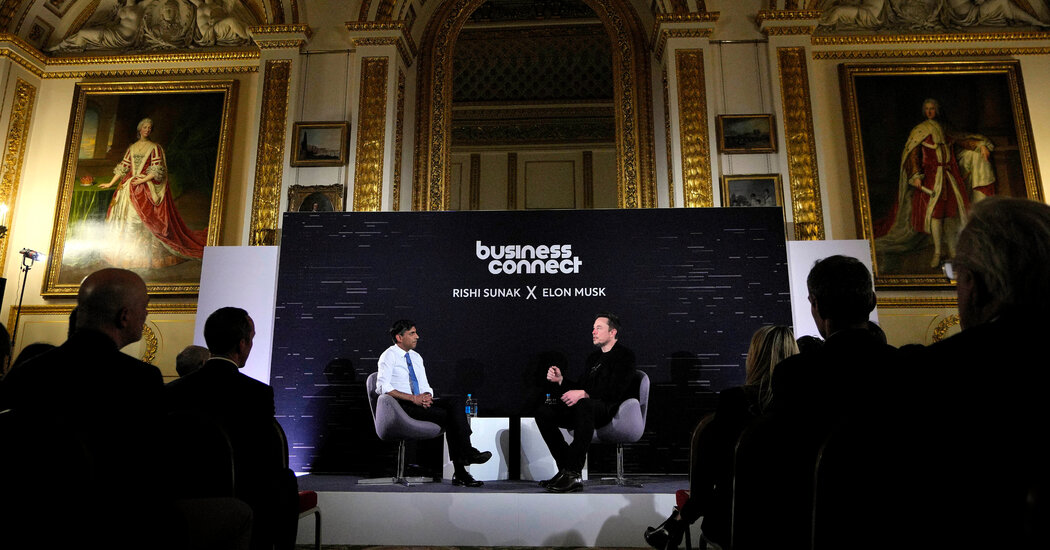Rishi Sunak Meets Elon Musk at A.I. Safety Summit
On Thursday evening, after an eventful couple of days hosting a wide array of government leaders, tech executives, and experts at a summit focused on the perils of artificial intelligence, British Prime Minister Rishi Sunak had one final appointment: a meeting with the enigmatic tech mogul, Elon Musk.
Musk, known for his influential presence in the tech world, attended the A.I. Safety Summit organized by Sunak at Bletchley Park, the historic estate where Alan Turing famously decoded the Nazis’ Enigma machine during World War II. The summit concluded with a declaration signed by representatives from 28 nations, acknowledging that while A.I. holds “enormous global opportunities,” it also carries the risk of “catastrophic harm.”
At Lancaster House, a former royal residence located near Hyde Park and Buckingham Palace, Sunak engaged Musk in a dialogue about the potential risks associated with A.I. and what measures, if any, the global community can take to mitigate these dangers. The conversation was streamed live on X, Musk’s social media platform formerly known as Twitter.
“A.I. will likely be a force for good,” Musk stated during the discussion. However, he cautioned that the probability of adverse outcomes is “not zero.” He emphasized that the pace of A.I. development is unprecedented, stating, “It is advancing faster than any technology I’ve witnessed in history.”
Sunak acknowledged the various risks posed by A.I. but attempted to downplay some of the more alarming concerns. While he often encounters voters anxious about job automation and potential unemployment, Sunak expressed his belief that A.I. would enhance productivity, create new job opportunities, and act as a “co-pilot” to assist workers rather than replace them—a viewpoint that starkly contrasts with the opinions of many labor unions.
The pairing of Sunak and Musk is indeed intriguing. Sunak, a polished former Goldman Sachs banker, has positioned himself as a stabilizing figure after the tumultuous tenures of his predecessors, Boris Johnson and Liz Truss. In contrast, Musk is known for his spontaneous social media activity and provocative statements, seemingly thriving in an environment of unpredictability and chaos.
Both figures are currently under significant scrutiny. Sunak’s grip on power is tenuous; his Conservative Party, which has governed for 13 years, is facing increasing criticism for a sluggish economy, ongoing labor strikes, and strained public services due to prolonged austerity measures. Meanwhile, Musk has faced backlash for allowing hate speech and other harmful content to proliferate on X since acquiring the platform last year.
With a background that includes attending Stanford University and a fondness for Silicon Valley, Sunak sought to leverage the event at Bletchley Park to position Britain as a leader in A.I. policy. Although the summit yielded little in terms of actionable policy, many attendees agreed it sparked a crucial global dialogue about A.I. safety.
Musk, whose ventures include Tesla and SpaceX, was undoubtedly the star attraction at the summit. On the preceding day, he participated in several closed-door sessions and was frequently approached for photographs by attendees. Max Tegmark, a professor at the Massachusetts Institute of Technology, noted, “People would come up and say, ‘Can I just take a selfie?’ and then quickly others would join in for their own pictures.” Sunak appeared equally impressed by Musk, opening their conversation with a quote from Bill Gates, praising Musk as one of the greatest inventors of his generation.
During their exchange, Sunak asked Musk, “What types of actions should governments like ours undertake?” with a tone of reverence. The audience comprised a mix of British officials and business leaders, including Demis Hassabis, the CEO of Google’s A.I. lab DeepMind, and the musical artist Will.i.am, who sat in the front row.
Many observers interpreted Sunak’s conversation with Musk as a strategic effort to enhance Britain’s appeal to entrepreneurs and technology firms at a time when the economy is struggling. A British journalist questioned Sunak during a news conference earlier that day, asking if the meeting was about A.I. or an attempt to attract a Tesla battery plant to the U.K. While Sunak acknowledged Musk’s expertise in A.I., the implications of the meeting were clear.
- “He wants the U.K. to attract investments,” explained Marietje Schaake, the international policy director at Stanford’s Cyber Policy Center, who moderated one of the summit discussions. She remarked that the Musk interview seemed to resemble a media stunt.
The conversation between Sunak and Musk occasionally ventured into the realm of science fiction. Musk articulated a vision of a future where computers could exceed human intelligence, rendering traditional work obsolete. He also speculated about the development of humanoid robots that would require off switches.
In an unexpectedly heartfelt moment, Musk shared that A.I. systems may evolve to become a person’s “great friend,” capable of remembering past conversations and personal preferences. He reflected on his son’s learning disabilities and challenges in forming friendships, stating, “An A.I. friend would be wonderful for him.”

Leave a Reply